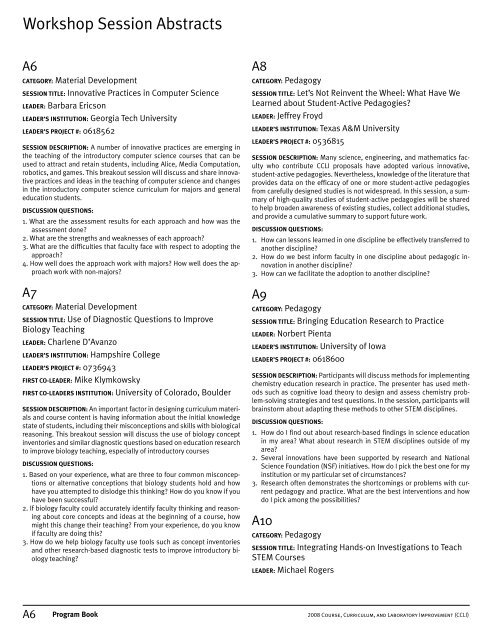Inventions and Impact 2: Building Excellence in Undergraduate ...
Inventions and Impact 2: Building Excellence in Undergraduate ...
Inventions and Impact 2: Building Excellence in Undergraduate ...
Create successful ePaper yourself
Turn your PDF publications into a flip-book with our unique Google optimized e-Paper software.
Workshop Session Abstracts<br />
A6<br />
Category: Material Development<br />
session title: Innovative Practices <strong>in</strong> Computer Science<br />
leaDer: Barbara Ericson<br />
leaDer’s <strong>in</strong>stitution: Georgia Tech University<br />
leaDer’s ProjeCt #: 0618562<br />
session DesCriPtion: A number of <strong>in</strong>novative practices are emerg<strong>in</strong>g <strong>in</strong><br />
the teach<strong>in</strong>g of the <strong>in</strong>troductory computer science courses that can be<br />
used to attract <strong>and</strong> reta<strong>in</strong> students, <strong>in</strong>clud<strong>in</strong>g Alice, Media Computation,<br />
robotics, <strong>and</strong> games. This breakout session will discuss <strong>and</strong> share <strong>in</strong>novative<br />
practices <strong>and</strong> ideas <strong>in</strong> the teach<strong>in</strong>g of computer science <strong>and</strong> changes<br />
<strong>in</strong> the <strong>in</strong>troductory computer science curriculum for majors <strong>and</strong> general<br />
education students.<br />
DisCussion Questions:<br />
1. What are the assessment results for each approach <strong>and</strong> how was the<br />
assessment done?<br />
2. What are the strengths <strong>and</strong> weaknesses of each approach?<br />
3. What are the difficulties that faculty face with respect to adopt<strong>in</strong>g the<br />
approach?<br />
4. How well does the approach work with majors? How well does the approach<br />
work with non-majors?<br />
A7<br />
Category: Material Development<br />
session title: Use of Diagnostic Questions to Improve<br />
Biology Teach<strong>in</strong>g<br />
leaDer: Charlene D’Avanzo<br />
leaDer’s <strong>in</strong>stitution: Hampshire College<br />
leaDer’s ProjeCt #: 0736943<br />
First Co-leaDer: Mike Klymkowsky<br />
First Co-leaDers <strong>in</strong>stitution: University of Colorado, Boulder<br />
session DesCriPtion: An important factor <strong>in</strong> design<strong>in</strong>g curriculum materials<br />
<strong>and</strong> course content is hav<strong>in</strong>g <strong>in</strong>formation about the <strong>in</strong>itial knowledge<br />
state of students, <strong>in</strong>clud<strong>in</strong>g their misconceptions <strong>and</strong> skills with biological<br />
reason<strong>in</strong>g. This breakout session will discuss the use of biology concept<br />
<strong>in</strong>ventories <strong>and</strong> similar diagnostic questions based on education research<br />
to improve biology teach<strong>in</strong>g, especially of <strong>in</strong>troductory courses<br />
DisCussion Questions:<br />
1. Based on your experience, what are three to four common misconceptions<br />
or alternative conceptions that biology students hold <strong>and</strong> how<br />
have you attempted to dislodge this th<strong>in</strong>k<strong>in</strong>g? How do you know if you<br />
have been successful?<br />
2. If biology faculty could accurately identify faculty th<strong>in</strong>k<strong>in</strong>g <strong>and</strong> reason<strong>in</strong>g<br />
about core concepts <strong>and</strong> ideas at the beg<strong>in</strong>n<strong>in</strong>g of a course, how<br />
might this change their teach<strong>in</strong>g? From your experience, do you know<br />
if faculty are do<strong>in</strong>g this?<br />
3. How do we help biology faculty use tools such as concept <strong>in</strong>ventories<br />
<strong>and</strong> other research-based diagnostic tests to improve <strong>in</strong>troductory biology<br />
teach<strong>in</strong>g?<br />
a6<br />
A8<br />
Category: Pedagogy<br />
session title: Let’s Not Re<strong>in</strong>vent the Wheel: What Have We<br />
Learned about Student-Active Pedagogies?<br />
leaDer: Jeffrey Froyd<br />
leaDer’s <strong>in</strong>stitution: Texas A&M University<br />
leaDer’s ProjeCt #: 0536815<br />
session DesCriPtion: Many science, eng<strong>in</strong>eer<strong>in</strong>g, <strong>and</strong> mathematics faculty<br />
who contribute CCLI proposals have adopted various <strong>in</strong>novative,<br />
student-active pedagogies. Nevertheless, knowledge of the literature that<br />
provides data on the efficacy of one or more student-active pedagogies<br />
from carefully designed studies is not widespread. In this session, a summary<br />
of high-quality studies of student-active pedagogies will be shared<br />
to help broaden awareness of exist<strong>in</strong>g studies, collect additional studies,<br />
<strong>and</strong> provide a cumulative summary to support future work.<br />
DisCussion Questions:<br />
1. How can lessons learned <strong>in</strong> one discipl<strong>in</strong>e be effectively transferred to<br />
another discipl<strong>in</strong>e?<br />
2. How do we best <strong>in</strong>form faculty <strong>in</strong> one discipl<strong>in</strong>e about pedagogic <strong>in</strong>novation<br />
<strong>in</strong> another discipl<strong>in</strong>e?<br />
3. How can we facilitate the adoption to another discipl<strong>in</strong>e?<br />
A9<br />
Category: Pedagogy<br />
session title: Br<strong>in</strong>g<strong>in</strong>g Education Research to Practice<br />
leaDer: Norbert Pienta<br />
leaDer’s <strong>in</strong>stitution: University of Iowa<br />
leaDer’s ProjeCt #: 0618600<br />
session DesCriPtion: Participants will discuss methods for implement<strong>in</strong>g<br />
chemistry education research <strong>in</strong> practice. The presenter has used methods<br />
such as cognitive load theory to design <strong>and</strong> assess chemistry problem-solv<strong>in</strong>g<br />
strategies <strong>and</strong> test questions. In the session, participants will<br />
bra<strong>in</strong>storm about adapt<strong>in</strong>g these methods to other STEM discipl<strong>in</strong>es.<br />
DisCussion Questions:<br />
1. How do I f<strong>in</strong>d out about research-based f<strong>in</strong>d<strong>in</strong>gs <strong>in</strong> science education<br />
<strong>in</strong> my area? What about research <strong>in</strong> STEM discipl<strong>in</strong>es outside of my<br />
area?<br />
2. Several <strong>in</strong>novations have been supported by research <strong>and</strong> National<br />
Science Foundation (NSF) <strong>in</strong>itiatives. How do I pick the best one for my<br />
<strong>in</strong>stitution or my particular set of circumstances?<br />
3. Research often demonstrates the shortcom<strong>in</strong>gs or problems with current<br />
pedagogy <strong>and</strong> practice. What are the best <strong>in</strong>terventions <strong>and</strong> how<br />
do I pick among the possibilities?<br />
A10<br />
Category: Pedagogy<br />
session title: Integrat<strong>in</strong>g H<strong>and</strong>s-on Investigations to Teach<br />
STEM Courses<br />
leaDer: Michael Rogers<br />
Program Book 2008 Course, Curriculum, <strong>and</strong> Laboratory Improvement (CCLI)


